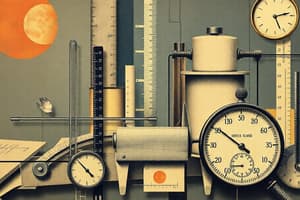Podcast
Questions and Answers
Which of the following is not a fundamental quantity
Which of the following is not a fundamental quantity
- Mass
- Current
- Force (correct)
- Time
Fundamental quantity are quantities that can
Fundamental quantity are quantities that can
- Be gotten from other quantities
- Are independent of other quantities (correct)
- Are derived from fundamental units
- All of the above
The SI unit of mass is
The SI unit of mass is
- Kg (correct)
- Cm
- Hour
- All of the above
To measure the thickness of a piece of paper what instrument would be more suitable
To measure the thickness of a piece of paper what instrument would be more suitable
The SI unit of force is
The SI unit of force is
Which of the following are derived quantity
Which of the following are derived quantity
In a laboratory experiments uche wants to record the time taken for each experiment conducted. What material is suggested for him to use for the highest degree of accuracy
In a laboratory experiments uche wants to record the time taken for each experiment conducted. What material is suggested for him to use for the highest degree of accuracy
The micrometer screw GUAGE is divided into two major parts namely;
The micrometer screw GUAGE is divided into two major parts namely;
The vernier calliper has a reading accuracy of
The vernier calliper has a reading accuracy of
What is the least possible error in using a rule graduated in centimeters?
What is the least possible error in using a rule graduated in centimeters?
Flashcards
Fundamental quantities
Fundamental quantities
Quantities that are independent of other quantities and cannot be expressed in terms of other quantities.
Derived quantities
Derived quantities
Quantities that are derived from fundamental quantities and can be expressed as a combination of other quantities.
Kilogram (kg)
Kilogram (kg)
The standard unit of measurement for mass in the International System of Units (SI).
Micrometer Screw Gauge
Micrometer Screw Gauge
Signup and view all the flashcards
Newton (N)
Newton (N)
Signup and view all the flashcards
Least possible error
Least possible error
Signup and view all the flashcards
Vernier Calipers
Vernier Calipers
Signup and view all the flashcards
Vernier Caliper Accuracy
Vernier Caliper Accuracy
Signup and view all the flashcards
Stopwatch
Stopwatch
Signup and view all the flashcards
Measurement
Measurement
Signup and view all the flashcards
Study Notes
Fundamental Quantities
- Fundamental quantities are quantities that can be measured independently of other quantities.
- Fundamental quantities are also known as base quantities.
- There are seven fundamental quantities. They are length, mass, time, electric current, temperature, amount of substance, and luminous intensity.
SI unit of Mass
- kilogram (kg) is the SI unit of mass
Measuring the thickness of a piece of paper
- Micrometer screw gauge is the suitable instrument to measure the thickness of a piece of paper.
- A micrometer screw gauge has higher precision than a ruler.
Derived Quantities
- Derived quantities are quantities that can be expressed in terms of fundamental quantities
- Examples of derived quantities include:
- Area
- Volume
- Density
- Speed
- Acceleration
- Force
- Work
- Power
SI unit of Force
- The SI unit of force is the newton (N)
- One newton is the force required to give a mass of 1 kg an acceleration of 1 m/s².
Recording Time In Experiments
- A stopwatch is suggested for recording time in laboratory experiments.
- A stopwatch is more accurate than a clock.
Micrometer Screw Gauge
- It has two major parts:
- The thimble
- The barrel
Vernier Calliper
- Vernier Calliper has a reading accuracy of 0.01 cm or 0.1 mm.
Least Possible Error Using a Ruler
- The least possible error in using a ruler graduated in centimeters is 0.5 cm.
Studying That Suits You
Use AI to generate personalized quizzes and flashcards to suit your learning preferences.



